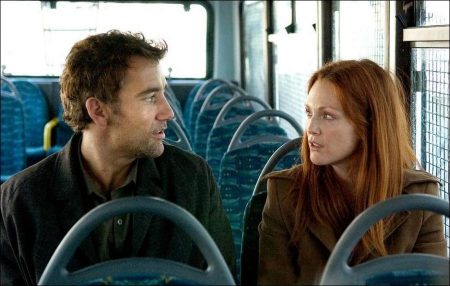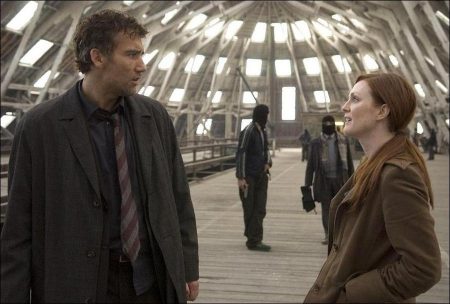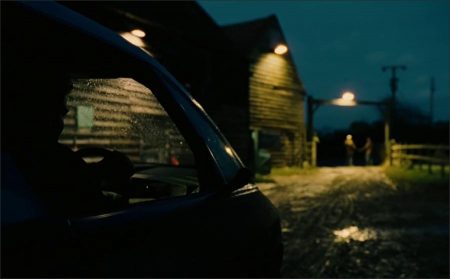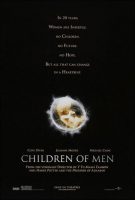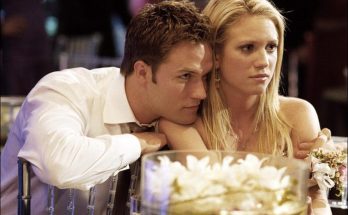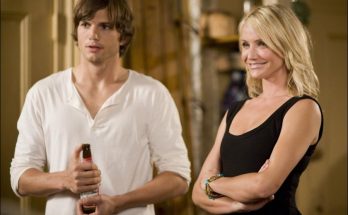Tagline: In 20 years. Women are fertile. No Children. No Future. No Hope. But all that can change in a heartbeat.
Earth, 2027: Hope for the future has become a dwindling resource. It has been nearly 19 years since the last baby was born, and with each passing year of inexplicable, global childlessness, mankind edges closer to giving up all claims to a future. While most people choose to embrace the inevitable and descend into separatism, lawlessness and nihilism, others fight on for a unified planet and the rights of the dwindling populations.
Great Britain is the one country that has managed -through a policy of militaristic imperialism- to survive the ever-increasing internal strife and, in turn, is seeing a tremendous influx of illegal refugees landing on its shores. But with a firm, totalitarian hand, these “fugees” are herded into detainment camps and deported.
For Theo (Clive Owen), all of this matters little, having allowed himself to settle into a state of numbness. The former activist turned bureaucrat has steeled himself against his painful past and the reality of a senseless future by simply ceasing to care. His existence is enlivened only by visits to his old friend Jasper (Michael Caine), who lives in the remote countryside miles from London. There, they remember happier times as comrades-in-arms, activists who once took up against the coming tide but now find themselves checked out from a society that no longer provides any answers.
All of that abruptly changes when Theo finds himself thrown in the back of a van and brought before Julian (Julianne Moore). Once his partner in both love and war, she is now the head of a covert group fighting for the rights of the remaining refugee population. Julian has surfaced long enough to ask for a favor—for Theo to obtain transit papers for Kee (Clare-Hope Ashitey), a young woman within her organization who must be seen safely out of the country.
Theo agrees—for Julian’s sake, and for the 5,000 pounds he’ll collect—and soon finds himself accompanying Kee and a handful of Julian’s comrades on a treacherous journey past several security checkpoints to the coast. There, members of the nearmythic Human Project—some of the greatest minds of the world working toward a new society—are prepared to help them. But when Theo’s group is set upon by terrorists, it quickly becomes clear that the streetwise Kee is more than just a refugee…she is someone others are willing to die for.
She is, in fact, eight months pregnant and now stands as the miracle the whole planet has been waiting and hoping for. In their race to sanctuary from both anarchists who will risk everything for a cause and those who would use her child for political gain, Kee and Theo become the unlikely champions of a future generation.
About the Production
For filmmaker Alfonso Cuarón, it seems that no story is beyond his cinematic telling: a biting social commentary, a noirish crime drama, a beloved children’s classic, a modernist retelling of Dickens, an insightful road comedy, a blockbuster magical tale.
All of his filmic efforts bear the unmistakable imprint of a craftsman utilizing every tool within the medium to realize the story on the screen. Each of them, in some way, tells the world a little bit about who “Alfonso Cuarón” is. So it is no surprise that his latest effort—the motion picture adaptation of esteemed British mystery writer P.D. James’ somewhat downbeat novel The Children of Men—also carries something of the Mexican-born auteur: hope.
The director admits, “When I make a film, it is from my standpoint—so the fact that I am a hopeful person ‘taints’ this film. Humanity has an amazing talent for destruction. But also, we can show solidarity and an ability to come through problems together. In the end, Children of Men isn’t so much about humanity being destructive— it’s more about ideologies coming between people’s judgment and their actions that is at work in this story.”
The publication of James’ book first came to the attention of producer Hilary Shor, who was taken with the stylistic departure for the author (famed for her crime writing, the book is decidedly science-fiction) and optioned the material for the screen nine years ago, having just set up the production company Hit and Run Productions.
“Propitiously,” Shor says, “it was really the first magical piece of material that I optioned. It’s obviously been a long time coming, but it’s been nine marvelous years bringing this project to fruition.”
Producer Marc Abraham of Strike Entertainment was also a fan of the book—a colleague had brought Abraham a copy and suggested that the story might play well as a motion picture. Abraham agreed and looked into adapting the book. Informed that the rights had already been secured, Abraham met with Shor and, realizing both shared a passion to bring The Children of Men to the screen, they committed to working together on the project. The project experienced waxing and waning periods of activity, but it finally started to gel when Oscar-nominated filmmaker Cuarón showed interest in it.
“Alfonso is a uniquely talented director. His passion is undeniable and his vision inspiring. His involvement reinvigorated all of us,” supplies Abraham. Cuarón had been given an early draft of a screenplay, but had barely turned past the first few pages. Later, while on vacation—in a place perhaps the antithesis of the inclement setting of The Children of Men—his thoughts returned to the project. Cuarón recalls, “I initially didn’t connect with the script, but there was a premise there that haunted me for the next couple of weeks. I remember being in Santa Barbara on the beach and suddenly seeing the whole film right there, in front of my eyes.”
Never interested in the techno-fests that usually fall under the header of either “science-fiction” or “futurism,” Alfonso was compelled to create a vision wholly grounded in the promises and the problems facing the citizens of today. He continues, “I found this premise was an amazing opportunity to talk about the present day, using the excuse that it’s set in the ‘near future.’ I didn’t want to do a film about the future—I wanted to do a film about the present, and the circumstances today that are crafting our future.” He quickly adds, “This isn’t science-fiction—it’s a chase movie, set in 2027.”
Cuarón approached his writing partner, Timothy J. Sexton, and related the story of the film he had envisioned on the beach. Together, they intensified the novelist’s view of a bleak and dystopic world of the near future into one in which people we are given a reason to believe again…taking James’ concept of global infertility and streamlining the book into a filmable screenplay.
At the time, author James had cast her tale 30 years into the future, giving readers a more comfortable distance from which to view the alarming vision of mankind’s possible end. The screenwriters narrowed this window to 21 years, bringing the harrowing “what if?” ever closer to the world of today. Children of Men is recognizable from the signposts of our current times, now nearly swallowed by a near-future world slowly coming apart in 2027.
Having become involved with the project early in 2001, Cuarón was also preoccupied with telling a story of relevance to the newly arrived 21st century. For him, many “futuristic” projects usually predict a world led by some kind of dictatorship, but he found a different kind of tyranny in the world he and Sexton were envisioning: “Many of the stories of the future involve something like ‘Big Brother,’ but I think that’s a 20thcentury view of tyranny. The tyranny happening now is taking new disguises—the tyranny of the 21st century is called ‘democracy.’ I found that a very interesting concept to look at in Children of Men.”
In his and Sexton’s informal research—questioning a wide range of people on what they feel is shaping our world—two elements were at the forefront of many replies: one, the massive global migration of the world’s population and the firestorm of political positioning around the shifts (figures support that the migrations of the last 10 years are the largest the planet has ever seen), and two, the ripple effect from and the backlash against the more than 300 years of colonialism. These current circumstances—when combined with such additional conditions as continental pandemics, rising international terrorism and global changes in weather patterns—are indeed flags that could signify a near future like the one conjectured in Children of Men.
Certainly, to Cuarón and Sexton, their world of tomorrow is rooted in the very real world of today. So, they took their ideas and themes and created a scenario timeline of the world events that had led up to the beginning of their screenplay: London on November 16, 2027. What results is a cautionary story that takes place—both in a poetic and a literal sense—“the day after tomorrow.”
As to whether or not the vision of the future as presented in Children of Men is bleak or hopeful? Its writer-director sees the film as a mirror that reflects the mindset of the viewers taking in the story. He offers, “When we were creating our fictitious timeline leading up to the film’s beginning, some of the things we included in our history actually started happening—we’d turn on the television and see images that we had included in our film, supposedly 21 years down the line. But, I don’t want to give people any ideas or easy answers to any questions…rather, I want to raise some questions for people to think about. So really, the movie is as hopeful about the future as you are.”
Continue Reading and View the Theatrical Trailer
Children of Men (2006)
Directed by: Alfonso Cuarón
Starring: Clive Owen, Julianne Moore, Gary Oldman, Charlie Hunnam, Chiwetel Ejiofor, Michael Caine, Mishal Husain, Danny Huston, Phoebe Hawthorne, Rita Davies
Screenplay by: David Arata, Alfonso Cuarón, Timothy J. Sexton
Production Design by: Jim Clay, Geoffrey Kirkland
Cinematography by: Emmanuel Lubezki
Film Editing by: Alfonso Cuarón, Alex Rodríguez
Costume Design by: Jany Temime
Set Decoration by: Jennifer Williams
Art Direction by: Ray Chan, Gary Freeman, Paul Inglis, Malcolm Middleton, Mike Stallion, Stuart Rose
Music by: John Tavener
MPAA Rating: R for violence, language, drug use, brief nudity.
Studio: Universal Pictures
Release Date: December 25, 2006
Visits: 173
